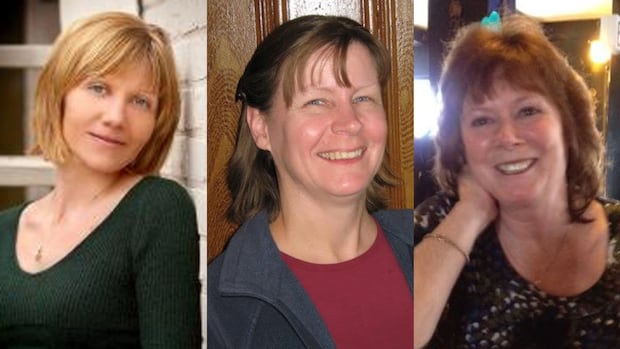OttawaIt’s been 10 years since the murders of Carol Culleton, Anastasia Kuzyk and Nathalie Warmerdam in Renfrew County. A high-profile coroner’s inquest into their deaths produced 86 recommendations, and advocates say that significant work — mostly at the grassroots level — has been underway for the past few years to better protect women.Advocates call on Ontario to implement inquest recommendations to end violence against women Julie Ireton · CBC News · Posted: Sep 22, 2025 4:00 AM EDT | Last Updated: 30 minutes agoThe annual Take Back the Night March was held in Killaloe, Renfrew County on Sept 18, 2025. Ten years ago, the event was cancelled the day three women were murdered. (Salah Tebessi/CBC)On Sept. 22, 2015, the Take Back the Night march in Renfrew County was abruptly cancelled. The annual event, held in various communities around the world, puts a spotlight on violence against women. But on that night police tape was wrapped around three different Ottawa Valley properties while families and residents struggled to comprehend what had just happened. Earlier that day, a local man had rampaged across the vast, rural county, murdering three women: Carol Culleton, Anastasia Kuzyk and Nathalie Warmerdam.Later, the news that the perpetrator’s abuse of women was chronic, and well-known by community members, the police and the justice system delivered a further sting and cries for change.”It still feels like it’s a fresh wound,” said Lori Norwood, director of the Renfrew County Sexual Assault and Rape Crisis Support Centre and organizer of the 2025 Take Back the Night march in Killaloe. “A lot of people still feel very scared, very hurt and very protective … It does feel like it just happened yesterday.”While it’s been 10 years since the killings, Norwood and other advocates say significant work to improve safety for women began three years ago after the high profile coroner’s inquest into the deaths produced 86 recommendations. And much of that work has happened at the grassroots level.’Holes and gaps’Lori Norwood is director of the Renfrew County Sexual Assault and Rape Crisis Support Centre and organizer of the 2025 Take Back the Night march in Killaloe. (Salah Tebessi/CBC)Malcolm Warmerdam was 18 when he lost his mother, Natalie, and in the years since her death he’s become an activist. “I learned that if I want them to know what actually needs to happen, I need to become the expert,” said Warmerdam, who took part in the inquest. “I know a lot about the failures of our system and the holes and gaps.”The inquest recommendations called for accountability, improved systemic approaches, better collaboration and communication between service providers, education, training, intervention and safety.”Changes are happening at the local level,” said Kirsten Mercer, a lawyer who represented End Violence Against Women – Renfrew County at the inquest. “We still have a lot of work to do to make our communities safer from gender-based violence, but there are signs of hope.” For starters, 106 Ontario municipalities — from Kapuskasing to Toronto — have declared intimate partner violence an epidemic.It was the inquest’s first recommendation. ‘Good things have come’Anastasia Kuzyk, Nathalie Warmerdam and Carol Culleton were murdered by the same man on September 22, 2015. (CBC News)”Action on the recommendations, it’s come not from the top down but from the bottom up and ultimately I think that’s better,” said Pamela Cross, who testified at the inquest. She’s also a member of Ontario’s Domestic Violence Death Review Committee.”People have worked collaboratively across different sectors that don’t always get along.”But the fact that the government of Ontario has not declared an epidemic of intimate partner violence rankles.”The current government in Ontario likes to think it’s doing all kinds of fabulous things. They’re not doing anywhere near enough,” said Cross. “Say yes, we have this epidemic in Ontario … Now we better look at some of those other 85 recommendations on that list, because clearly if it’s an epidemic, it requires government level involvement.”But changes in the county have been significant, according to Mary Leigh Elliot, executive director of Victim Services of Renfrew County, noting the improved relationship between her group and police.”Good things have come out of that inquest. We had various townships and the county itself declared intimate partner violence an epidemic, which opened up opportunities for supports,” said Elliot.For its part, the Ontario Provincial Police introduced 70 “abuse issues investigators” across the province, hired to ensure their police work takes a victim-centred, trauma-informed approach. That includes two officers in the Upper Ottawa Valley detachment and one in Renfrew.Julianna Morin, coordinator of End Violence Alliance of Renfrew County, says much more can be done.”Ensure that there are spaces at every level in Renfrew County where survivors are heard, seen, and believed, and that there’s an opportunity for survivors to effectively and immediately and appropriately access the services and supports that they need without red tape, without preventable barriers,” said Morin.Calling it femicideJulianna Morin is coordinator of End Violence Alliance of Renfrew County. (Salah Tebessi/CBC )Over the past several months, both Ottawa and Kingston police services have called recent murders “femicides” in their news releases.This shift in language, says Mercer, is a product of the improved relationships between the movement and “justice sector partners.” “Increasing the mutual trust and respect in those relationships is essential to making people safer in the community, and I think we can draw a direct line from the inquest to some of those changes,” said Mercer.And while Mercer says it’s too soon to celebrate, the fact that the number of femicides in Ontario has gone down this year could be evidence of those improvements.A proposed law, introduced by New Democratic Party members, calls on the Ontario government to recognize intimate partner violence as an epidemic. It also asks the province’s Attorney General to establish a Renfrew County Inquest Implementation Committee to consider the recommendations and take steps to implement them. Bill 55 has passed first reading at Queen’s Park, but it’s not expected to get to second reading this year. A previous, similar bill died when the election was called last winter.CBC asked the Attorney General’s office if the government would support Bill 55, but did not receive a response. Prevention key Pamela Cross testified at the inquest into the 2015 murders. She’s also a member of Ontario’s Domestic Violence Death Review Committee. (Felix Desroches/CBC)Pamela Cross, who wrote the book And Sometimes They Kill You about the epidemic of intimate partner violence, says prevention is key. “We’re not doing much to stop the abuse from happening,” said Cross. “We have to look at alternatives to the present criminal system, things like restorative or transformative justice models, not to replace the criminal law, but to stand equally at its side and offer more options. There’s a lot of people who engage in abusive behaviour who don’t want to do it.”For anyone affected by family or intimate partner violence, there is support available through crisis lines and local support services .If you’re in immediate danger or fear for your safety or that of others around you, please call 911.ABOUT THE AUTHORJulie Ireton is a senior investigative reporter with CBC Ottawa. She’s also the multi-award winning host of the CBC investigative podcasts, The Banned Teacher found at: cbc.ca/thebannedteacher and The Band Played On found at: cbc.ca/thebandplayedon You can reach her at julie.ireton@cbc.ca
Thursday, 5 Feb 2026
Canada – The Illusion
Search
Have an existing account?
Sign In
© 2022 Foxiz News Network. Ruby Design Company. All Rights Reserved.
You May also Like
- More News:
- history
- Standing Bear Network
- John Gonzalez
- ᐊᔭᐦᑊ ayahp — It happened
- Creation
- Beneath the Water
- Olympic gold medal
- Jim Thorpe
- type O blood
- the bringer of life
- Raven
- Wás’agi
- NoiseCat
- 'Sugarcane'
- The rivers still sing
- ᑲᓂᐸᐏᐟ ᒪᐢᑿ
- ᐅᑳᐤ okâw — We remember
- ᐊᓂᓈᐯᐃᐧᐣ aninâpêwin — Truth
- This is what it means to be human.
- Nokoma










